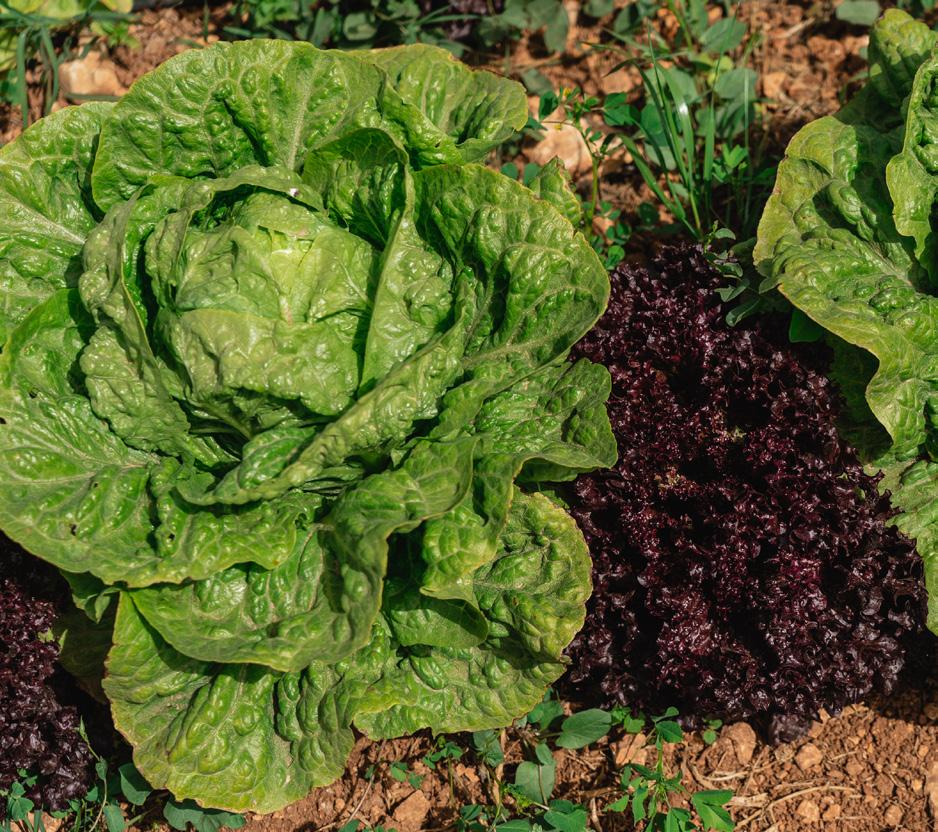
3 minute read
Diffirent Varieties of Lettuce
DIFFERENT TYPES OF LETTUCE GROWN IN MALTA
Follow along with this column by Emily A Francis, as we explore further into
the culture and cuisine of the Maltese Islands, starting off with fresh foods as
a single item, grown and harvested locally
Words by Emily Francis
I had the pleasure of taking a trip over to Vincents Eco Estate to speak with farm manager Pawlu Debono on the growing practices of a certified organic farm. This large and lovely land can be found in Zebbieh, in Mgarr.
We decided to look into lettuce for
this interview because lettuce does
not have an actual season and instead
can be grown all year round. However, August is the most difficult season for the lettuce to grow because they don’t do as well with the extreme heat. This
is when Pawlu covers up the lettuce plants to help to give them shade.
To keep lettuce available to the customers, lettuce is planted every two weeks and it takes between 70 and
90 days for the lettuce to grow. At all times there are different plots of lettuce growing in various stages to ensure it’s always in production. This is how the planting and harvesting can remain on a continual loop.
At Vincent’s Eco Estate, there are five types of lettuce grown: cabbage
head, Romain, red curly, green curly, and endive.They plant lettuce every two weeks to keep the shop supplied daily. It takes between 70 to 90 days for the lettuce to grow. They grow three generations of lettuce at a time to accomplish this feat of keeping it always ready to be harvested.
CERTIFIED ORGANIC FARM
It’s quite difficult to get a certification for organic farms in Malta due to the lack of growing space, the issues with the wind, and the area around the farm that would ensure that the winds do
not bring in any other type of seed or material that are used in other nonGrowing food organically means that instead of using any sort of synthetic chemicals in its fertiliser, and pesticides, only natural mixtures are applied throughout the entire process of farming the plants. If it’s synthetic chemicals are used and are not fully digested into the soil, the chemicals will end up in our food. In Pawlu’s practice of growing the most commonly used fungicide is sulfur. The other main mixture that they use that dates back to the Egyptians is a Bordeaux mixture of lime mixed with
copper sulfate which equals copper carbonate. This keeps the bugs away without being toxic to the foods.

OTHER FOODS AT THE ECO ESTATE
They grow so many different crops all year round. We saw cabbage, broccoli, cauliflower, aubergines, spring onion, zucchini, beans, turnips, tomatoes, and green peppers when we visited.
OUTINGS AT THE FARM
While I was visiting for our interview, a school bus pulled up with a few different classes of children to visit
the farm as a field trip. The farm has a playground, it houses ten dogs and several free-range chickens.
They are also hosting a summer club for children to come and learn.
Beyond class field trips they also host agriculture students who wish to come and study organic farming. They are dedicated to striving for sustainable farming practices and teaching others how to do the same.












